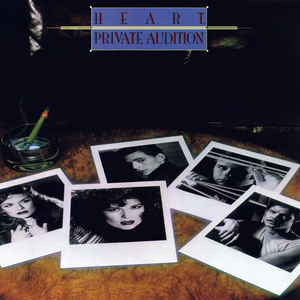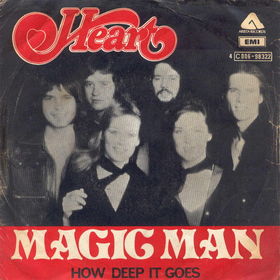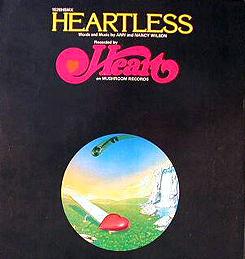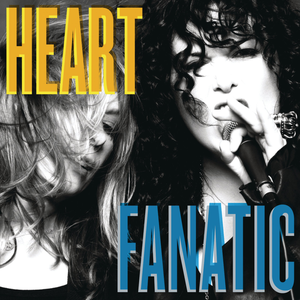
Heart is an American rock band formed in Seattle, Washington, in 1973. The band evolved from previous projects led by founding members Roger Fisher (guitar) and Steve Fossen, including The Army (1967–1969), Hocus Pocus (1969–1970), and White Heart (1970–1973). By 1975, original members Fisher, Fossen, and Ann Wilson, along with Nancy Wilson, Michael Derosier (drums), and Howard Leese formed the lineup for the band's initial mid- to late-1970s success period. These core members were included in the band's 2013 induction into the Rock and Roll Hall of Fame.

Nancy Lamoureux Wilson is an American musician. She rose to fame alongside her older sister Ann as guitarist and second vocalist in the rock band Heart.

Little Queen is the third studio album by American rock band Heart, released in May 1977 by Portrait Records. The album was recorded and mixed at Kaye-Smith Studios in Seattle, Washington, from February to April 1977. On June 29, 2004, a remastered version of Little Queen was released by Epic Records and Legacy Recordings with two bonus tracks.

Too Low for Zero is the seventeenth studio album by English musician Elton John, released in 1983. The album marked a comeback for John, whose previous four albums had failed to yield many enduring international hit singles, and had disappointing sales compared to his string of hit records released during the first half of the 1970s.

Magazine is the second studio album by American rock band Heart. It was originally released on April 19, 1977, by Mushroom Records in unfinished form, without the band's permission. A second authorized version of the album was released on April 22, 1978. The album has been certified platinum in both the United States and Canada.

Dog & Butterfly is the fourth studio album by American rock band Heart, released in September 1978, by Portrait Records, following a legal dispute with Mushroom Records over the release of the band's second studio album, Magazine, in April 1978. Dog & Butterfly peaked at number 17 on the US Billboard 200 and has been certified double platinum by the Recording Industry Association of America (RIAA). The album spawned the singles "Straight On" and "Dog & Butterfly".

Bébé le Strange is the fifth studio album by American rock band Heart, released on February 14, 1980, by Epic Records. It was the first album without founding member Roger Fisher on lead guitar, who had left the band months prior along with his brother Michael.

Private Audition is the sixth studio album by American rock band Heart, released on May 20, 1982, by Epic Records. The album reached number 25 on the US Billboard 200, spending 14 weeks on the chart. It spawned the single "This Man Is Mine", which peaked at number 33 on the Billboard Hot 100. It is the last Heart album to feature longtime members Mike Derosier and Steve Fossen, who left after the recording of the album and were replaced by Denny Carmassi and Mark Andes.

Heart is the eighth studio album by American rock band Heart, released on June 21, 1985, by Capitol Records. The album continued the band's transition into mainstream rock, a genre that yielded the band its greatest commercial success. Marking the band's Capitol Records debut, it became Heart's only album to top the US Billboard 200 to date. The album was eventually certified quintuple platinum by the Recording Industry Association of America (RIAA)—in contrast to Heart's previous two releases, Private Audition and Passionworks, which were uncertified.

The Road Home, a live album released in 1995, is the fourteenth album overall by the rock group Heart. It chronicles a club performance in the "unplugged" style in their home city of Seattle. The setlist contains acoustic versions of many of the band's hits including "Dreamboat Annie", "Alone", "Barracuda".

"Magic Man" is a song by the American rock band Heart released as a single off their debut album, Dreamboat Annie. Written and composed by Ann and Nancy Wilson, the song is sung from the viewpoint of a young girl who is being seduced by an older man, much to the chagrin of her mother, who calls and begs the girl to come home. In an interview, Ann Wilson revealed that the "Magic Man" was about her then boyfriend, band manager Michael Fisher, and that part of the song was an autobiographical tale of the beginnings of their relationship. Roger Fisher came up with the alternative tuning EADGDG for his guitar part. The album version of "Magic Man" features an over-two-minute instrumental break which consists of a guitar solo and the usage of a Minimoog synthesizer, while the single version of the song edits out most of this break, cutting it down from 5:28 to 3:29.

"Crazy on You" is a song by American rock band Heart from their debut studio album, Dreamboat Annie (1975). It was released in March 1976 as the album's third single in Canada and the album's debut single in the United States. It reached the top 25 in Canada and the top 35 in the US. It found more success in the Netherlands and Belgium where it peaked at number 2 and 13, respectively, in early 1977 after its release as the second single from Dreamboat Annie in those countries. It is considered one of Heart's signature songs as it is one of the most played tracks on classic rock radio stations in the US.

"Barracuda" is a song by American rock band Heart, released in 1977 on their third studio album, Little Queen, and was released as the album's lead single. The song peaked at number 11 on the Billboard Hot 100. In 2009, "Barracuda" was named the 34th-best hard rock song of all time by VH1.

"Dreamboat Annie" is a song written and recorded by the rock band Heart. It is the title track from their debut album Dreamboat Annie and was released as its third single in 1976. The song had originally appeared as the B-side to Heart's debut single "Crazy on You" earlier that year.

"Heartless" is a song written and recorded by the rock band Heart in 1976 for their album Magazine. Issues with the band's previous record label Mushroom caused a delay in the album's release and "Heartless" was released as a single two years later, after the re-issue of their first single "Crazy on You".

"Dog & Butterfly" is a song recorded by the rock band Heart. It is the title track to the band's fourth studio album Dog & Butterfly and was released as the album's second single.

Howard M. Leese is an American guitarist, record producer, and musical director who played with Heart as guitarist and keyboardist for 23 years. He continues to record and tour as a solo artist, and as guitarist with The Paul Rodgers Band and Bad Company. In 2013, he was inducted into the Rock and Roll Hall of Fame as a member of Heart.

Dreamboat Annie Live is a live DVD released by the American rock band Heart in October 2007, which features Heart performing all ten songs from their 1975 debut album, Dreamboat Annie, plus five extra performances. The concert was also broadcast on DirecTV. The concert soundtrack was released as a live album, with the UK edition containing two bonus live tracks.

Fanatic is the fifteenth studio album by American/ Canadian rock band Heart, released on October 2, 2012, by Legacy Recordings. The album was recorded in hotel rooms and studios up and down the West Coast, with Grammy Award-winning producer Ben Mink, who had previously produced Red Velvet Car (2010), back at the helm.

Beautiful Broken is the sixteenth studio album by American rock band Heart, released on July 8, 2016, by Concord Records. Aside from two new songs, the album consists mostly of re-interpretations of songs from the band's earlier albums.



















